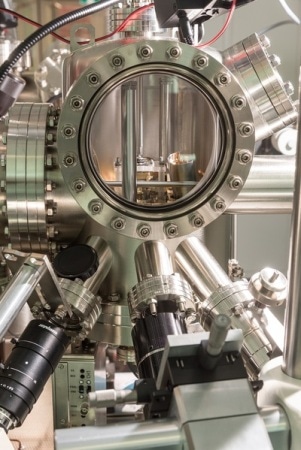Sep 12 2017
Silicon Quantum Computing, which holds the distinction of being Australia’s first hardware quantum computing company, has been launched at the University of New South Wales (UNSW).
 This scanning tunnelling microscope (STM) is used to perform lithography, allowing a single phosphorous atom to be placed in a silicon crystal to form a qubit: the basic unit of a quantum computer. (Credit: cqc2t.org)
This scanning tunnelling microscope (STM) is used to perform lithography, allowing a single phosphorous atom to be placed in a silicon crystal to form a qubit: the basic unit of a quantum computer. (Credit: cqc2t.org)
Launched earlier this week at UNSW’s Kensington campus, Silicon Quantum Computing will work alongside the Australian Research Council (ARC) Centre of Excellence for Quantum Computation and Communication Technology (CQC2T). Operating from new laboratories within CQC2T’s UNSW headquarters, the company will drive the development and commercialisation of a 10-qubit quantum integrated circuit prototype in silicon by 2022 as the forerunner to a silicon-based quantum computer — which, if successful, would have the potential to solve in hours or minutes problems that would take conventional computers — even supercomputers — centuries.
The NSW Government is the latest partner to join the $83 million venture, pledging $8.7 million from its recently announced Quantum Computing Fund. The commitment builds on earlier investments from UNSW and its quantum computing researchers ($25 million), the Commonwealth Bank ($14 million), Telstra ($10 million over two years) and the Australian Government ($25 million over five years).
Federal Minister for Science, Innovation and Industry Arthur Sinodinos congratulated the company partners for their vision, claiming, “If Australia wins the global race to build a functional quantum computer, it will create new industries and job opportunities across our economy.”
Sinodinos said the power and potential of quantum computing is “game changing”, set to offer enormous advantages to sectors including finance, security and transport.
“The transformative impact of quantum computing will be particularly relevant in the healthcare sector,” he said. “Instead of waiting for years, personalised medicines could be made available very quickly, saving not just time, but, importantly, lives.”
The company’s interim chair, corporate lawyer and company director, Stephen Menzies, hailed the three-way partnership between research, industry and government as a new direction for the commercialisation of Australian research, stating, “The public-private venture establishing Silicon Quantum Computing Pty Ltd is an important pilot scheme to develop a new pathway for commercialising leading Australian research.
“It will maintain vital IP in Australia and develop a nascent quantum information ecosystem here in NSW,” Menzies said.
CQC2T is home to an impressive team of silicon quantum computing researchers, said to be the only group in the world that can make atomically precise devices in silicon. Led by UNSW Scientia Professor Michelle Simmons, a member of the Silicon Quantum Computing board, the centre’s teams have produced the longest coherence time qubits in the solid state, the ability to optically address single dopant atoms in silicon, the lowest noise silicon devices and the first two qubit gate in silicon.
“It’s an exciting time to invest in this new industry that will shape the 21st century,” said Professor Simmons. “With Silicon Quantum Computing Pty Ltd now incorporated, we are fully committed to developing a 10-qubit silicon prototype. We are open for business and open to further investment from interested partners.
“The public-private venture establishing Silicon Quantum Computing Pty Ltd seeks to develop a quantum information ecosystem here in Australia. It will involve leading scientists and engineers at UNSW and the University of Melbourne, which together with other institutions that are part of CQC2T will develop a scalable, error-corrected quantum computer in silicon.”
Up to 40 staff are projected to be hired as a result of the new company, including 25 postdoctoral researchers, 12 PhD students and lab technicians, with recruitment currently underway. The company is also on the lookout for additional shareholders, said Menzies — “all of whom we hope will bring strategic focus to the business and who will bring their own enthusiasm and passion to the technologies”.